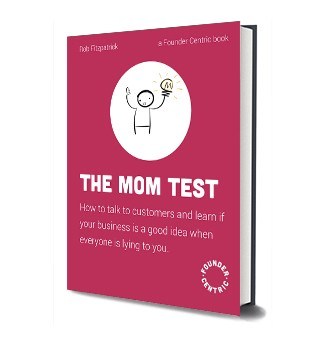Why I forced my whole team to read The Mom Test

If you've read my other post about validating your startup idea, you'd know that my startup, Toasty, went through a critical pivot after failing the 1st idea.
When we made such a pivot, I decided we had to do something drastically different, which was to pay more attention to user research and interviews.
Instead of jumping into product development, I stopped what everyone was working on for 2 days, and asked my entire team to read a customer interview book called the Mom Test by Rob Fitzpatrick.
I also asked my team to come together and form a discussion to each share our learnings.
I've never seen such a great way to align everyone by learning on the same topic and firing questions and insights at each other. Not only did we form a new approach to building our new product, but we were also shaping our company culture around problems and customers.
The importance of talking to customers
We can all agree that building a startup, especially in technology, is super exciting.
When you get incredibly excited, you often try hard to convince other people that you have the best idea. But, this is where things can very much go wrong. The idea might be perfect in your own mind, but it isn't valuable at all in the target customer's mind.
In the world of philanthropy, there is a term called "Philanthropic Colonialism". It means that well-meaning outsiders think they understand the challenges facing the local people better than the local people themselves. They then decided on how they'd help solve these challenges by enforcing solutions.
The truth is, that these outsiders can never understand the local people's challenges. When you're not in the exact same circumstance, you just can't possibly know.
The same goes for creating a tech product for the world. It is arrogant to think that you can create a product your target customers want ... until you actually talk to them. The conversations will lead you to identify their problems and needs, in which you can help create solutions to solve them.
The key here is to talk to the customers. Surprisingly, a lot of founders never talk to any potential customers before building out their ideas.
And this is why the Mom Test is such an important book to address the proper way to do customer interviews.
A go-to book for user and customer interviews.
What the Mom Test preaches
Here is a quick description of what the Mom Test is about:
"They say you shouldn't ask your mom whether your business is a good idea, because she loves you and will lie to you. This is technically true, but it misses the point. You shouldn't ask anyone if your business is a good idea. It's a bad question and everyone will lie to you at least a little. As a matter of fact, it's not their responsibility to tell you the truth. It's your responsibility to find it and it's worth doing right ."
In the current world we live in, most people are nice to each other. They don't mean to lie, but because saying your idea sounds interesting and giving your words of affirmation are what you want to hear (plus it doesn't cost them money), it is simply easier to do so.
Then, if not pitching our idea? How do we know if the idea is actually good?
By focusing the customer interviews on the past. We can talk about their past experiences and how they're currently dealing with a problem. For example, "Every week I spend 2 hours researching activities that I can do with my toddlers. I go to these websites X, Y, Z, and then put all ideas in my Notion. When I need them, I go through the list and pick the ones we can do"
With this information in hand, we can identify the pain points: 1) definitely time-consuming (2 hours a week) to research activities, 2) organizing ideas in Notion could be time-consuming, and 3) picking out ideas could also be time-consuming
We can dig deeper and work out our solutions to tackle some of the pain points. This is all without having to ask the interviewee whether our idea is good or not. We already know it is solid.
Reshaping Toasty's product culture
We took the learnings and implemented a new approach to our product development:
We always listen to customers for their problems and pain points
We never pretend to be our own customers and decide on their needs for them. We talk to them directly and understand their experiences and challenges. During conversations with customers, most time is spent asking them questions instead of talking.
We are in love with the problem, not the solution
We know that it is very easy to be stuck in the ideation mode and design lots of solutions to solve a problem. Instead of doing that, we should be more obsessed with working on the right problem and know that the solution to solve it can be changed.
We keep learning and sharing
We know that it is important to share user interview insights, but it is impossible for the entire team to be talking to customers directly. We set up a system to take notes and validate hypotheses that the whole team can review. This way we keep a transparent validation flow and avoid biases.
But of course, even with the right framework in place, running user interviews and extracting the right information are still some of the hardest parts of building startups. We made a ton of mistakes in our journey and learned to avoid these traps in the future.